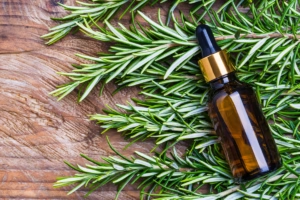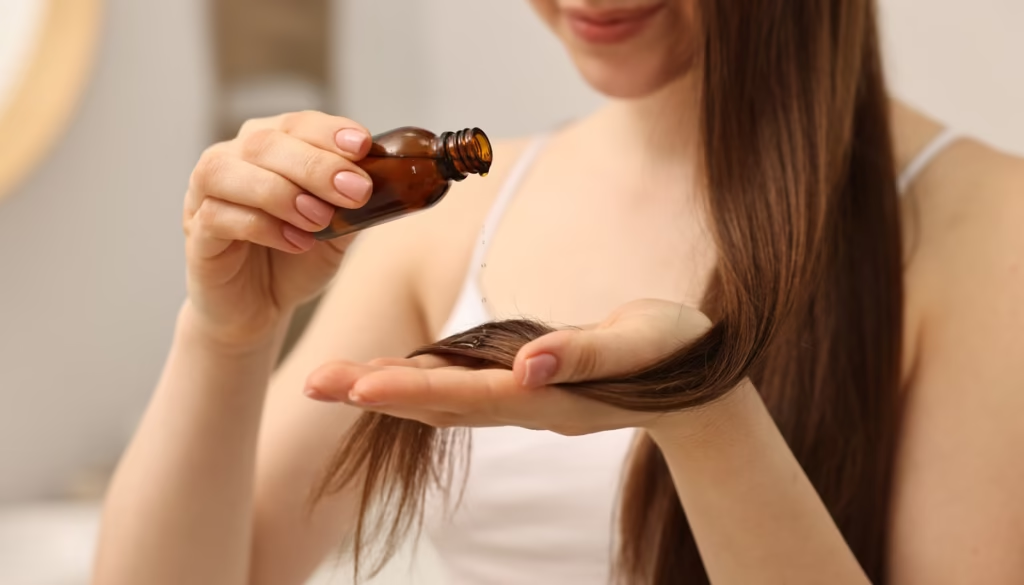How to Use Rosemary Oil For Hair Growth
Thousands are swapping chemical hair products for a natural remedy that’s been trusted for centuries. Could rosemary oil be the secret your hair routine is missing?
Introduction
Rosemary oil extracted from the Rosmarinus officinalis shrub has been used for centuries due to its medicinal properties.
The use of rosemary has been established in traditional medicine mainly in the area of hair and scalp care, and its benefits with Anti-inflammatory, antioxidant, and antimicrobial properties.
These are the same characteristics provided by minoxidil, the drug which is conventionally used for treating hair loss, hair growth, and scalp health and thus rosemary oil of today becomes the natural alternative to minoxidil (Rogaine).
How does Rosemary Oil help in Hair Growth?
Rosemary oil can be the oil of choice for stimulating hair growth through scalp blood flow improvement and hair follicle activation.
This is the same biological function as a minoxidil drug that triggers hair growth just in a different manner.
Although further evidence involving larger-scale studies is necessary, current studies and user reports have verified its efficiency.
The benefits from rosemary oil are as follows:
- Increasing blood circulation to hair follicles
- Reinforcing of hair follicles to enable new growth
- Acting as a natural agent that inhibits inflammation to save the scalp
How To Use Rosemary Oil For Hair

The essential oil of rosemary is concentrated and, therefore, it is advisable to mix it with a carrier oil before applying it to the scalp. Here are the steps through which you can safely do your hair care using this oil.
1. Rosemary Oil Scalp Treatment
- Combine a few drops of rosemary oil with around 1-2 teaspoons of a carrier oil i.e. argan, coconut, or jojoba oil.
- Rub the blend gently on the scalp choosing to use your fingers.
- Allow it to sit for 5-10 minutes before washing it off in the shower, or letting it remain for a more profound effect.
2. Rosemary Oil Shampoo
- Drip multiple drops of rosemary oil into your regular shampoo.
- Regularly perform your hair washing routine, focusing on taking care of the scalp.
- Rinse thoroughly and use as often as you usually wash your hair, adjusting as your scalp responds.
3. Rosemary Oil Root Spray
- In a spray bottle, put a few drops of rosemary essential oil and 2 teaspoons of a carrier oil.
- Add the rest of the distilled water to fill the bottle.
- Place the one with the water on your scalp through the day or when needed and softly massage the concoction in the hair.
Tip: Try once or twice a week in the beginning and then you can decide to increase the frequency if no irritation happens.
Hair Benefits of Rosemary Oil
Rosemary oil brings many advantages to the hair and scalp that make it a great treatment for those with thinning or loss of hair.
Stimulates Hair Follicles
- Rosmarinic acid present in rosemary oil is effective in relaxing vessels and thus a lot of nutrient-rich blood flows to the hair follicles deep in the scalp.
- The increased flow of blood leads to more nutrients and oxygen in the hair follicles, and this further induces hair growth.
Regenerates Hair Follicles and Blocks Androgens
- Rosemary oil, which contains b12-methyl carnosic acid, can possibly prevent the androgen effect in addition to reactivating the hair follicles that have been sleeping.
- Moreover, the increased blood supply reduces the number of hair follicles affected by androgen and simultaneously promotes the recovery of the resting follicles.
Improves Male-Pattern Hair Loss
- A six-month comparison established that rosemary oil was as effective as the use of 2% minoxidil in men with androgenetic alopecia.
- Studies on animals have additionally shown that the solution of rosemary oil lotion had the same result as minoxidil 2%.
Reduces Dandruff
- While it cannot be said that this is a definitive cure, the antifungal properties of rosemary oil may eliminate the dermatophytes that are responsible for dandruff.
- Frequent use can help to manage the peeling and the issues on the scalp, which are usually caused by fungi.
Relieves Itchy Scalp
- Rosemary oil with its anti-inflammatory properties calms the skin that is dry, red, or irritated.
- Besides this, the fungus-destroying effectiveness of the plant may also cut the itchiness resulting from skin infections caused by fungi.
Simple Yet Amazing Ways to Use Rosemary Oil
Aside from blending rosemary oil with your shampoo or carrier oils, you can also combine it with other natural ingredients to create a more personalized regime, ensuring that your hair problems are thoroughly addressed. Here are a few remedies that you should go for:
1. Rosemary Oil and Castor Oil Growth Serum
Castor oil contains a lot of ricinoleic acid, which is a compound highly associated with hair thickness and strength. If this oil is then mixed with rosemary, the outcome will be the very best growth serum in the world.
What to do:
- Get 2 tablespoons of castor oil and add 5–7 drops of rosemary essential oil.
- Warm but not too hot for your hair.
- Apply the mixture to your scalp and massage it for 5 minutes, focusing on the areas where your hair is thinning.
- At night, let it stay, and in the morning, wash it off your hair.
Note: A shower cap will prevent oil from staining your pillow!
2. Rosemary Oil and Aloe Vera Scalp Gel
Aloe Vera has a soothing effect on the scalp, giving you the moisture required to stay healthy and the perfect match for rosemary oil as well.
How to make it:
- Get 2 tablespoons of pure aloe vera gel.
- Insert 5-8 drops of rosemary oil.
- Stir until it becomes creamy and apply it directly to the scalp.
- After that, wait 30 minutes before you rinse the product with lukewarm water.
Bonus: This combo helps to cool down the itching and gives more shine to your hair!
3. Rosemary Oil and Coconut Oil Hot Treatment
While coconut oil provides the hair with moisture by penetrating the hair shaft, rosemary activates the scalp.
How to make it:
- Mix 3 tablespoons of coconut oil with 7-10 drops of rosemary oil.
- Make the combination warm (not hot) so that it can easily find its way to the hair roots.
- Gently rub the oil mix into the whole head of hair and scalp, ensuring that the strands are well-coated.
- Then, cover your hair with a warm towel and let the oil work for 1-2 hours.
- Take a shower and rinse thoroughly.
Great for: Extremely dry, brittle, or overly damaged hair.
Real-Life Experience: The Power of Consistency
As reported by Vogue, rosemary oil has benefited numerous users, with many claiming that it was just what they needed during very stressful times to produce the desired results.
The experience was shared by one user who mentioned that due to the high levels of stress, her hair started to fall out considerably, leaving a wider area in the middle of her head without hair.
Upon consulting a trichology specialist to rule out severe conditions such as hormonal imbalances, she was advised to use a natural remedy — rosemary and mint oil.
She and her partner did the following things:
- Application of the rosemary oil mixture every day.
- Continual rubbing of their scalp to provide circulation points.
- Monitoring for any irritation and adjusting usage accordingly.
In time, not only did the hair become stronger, but it also experienced a noticeable regrowth. Furthermore, one user’s story just added another positive voice to the more than 82,000 that were already singing praises of rosemary oil, confirming the product’s efficacy.
Understanding The Science Behind Thinning Hair
There are a number of reasons why the hair can get thin, such as:
- Illness or stress
- Unbalance in hormones
- Lack of nutrients
- Hereditary factors
One needs to consult a professional, like a trichologist, for their sudden or severe hair loss. A correct identification of the problem can make it possible to treat the disease, if any, and besides using the suitable remedy, for example, rosemary oil, to regrow your hair.
Conclusion
Rosemary essential oil has proven to be reliable in the natural hair growth promotion, the reinvigoration of the scalp as well as the strengthening of hair strands department.
What are attractive in rosemary oil are its antioxidant, anti-inflammatory and blood-circulation-boosting components as it presents the option of a soft and yet really effective alternative to the dominant chemical hair growth treatments.
In particular, whether you are applying it with carrier oils, aloe vera, or shampoo, the long-term usage of the essential oil can make your hair thicker and healthier.
Always make sure to undertake the proper dilution of essential oils and also have some patience as nature is not swift but the magical part about natural-remedies is that they are long-lasting and bring beautiful results.
FAQs
1. Can I leave rosemary oil in my hair daily?
Of course, you are permitted to leave diluted rosemary oil in your hair daily when it is accepted by your scalp. First, you can put it on once or twice a week, to see if your skin tolerates the oil well.
After that, you can continue with the application if everything is okay even up to a daily application but do not forget to dilute it with a carrier oil like coconut or jojoba to prevent the occurrence of irritation.
2. How long does rosemary oil take to grow hair?
On the one hand, everyone’s hair growth experience will vary, but it is common to see clear signs of improvement within three to six months through consistent application.
Comparatively, a study that examined the efficacy of rosemary oil vis-à-vis minoxidil found that after six months of use, both products had nearly equal outcomes. You, of course, need to be persistent and also do it regularly whenever you apply this oil.
3. Does rosemary oil help with dandruff?
Rosemary oil effectively gives support to the problem of dandruff as the essential oil contains properties that are known to be antifungal and also anti-inflammatory.
The product aims at the same time as the fungi causing the scalp’s problems to reduce and at the same time, it soothes the extrinsic irritation which makes it the best native way that the scalp, which is constantly suffering from dandruff, can be free of the problem.
4. Can I combine rosemary oil with other essential oils?
Most definitely! Rosemary oil goes great with other oils such as peppermint oil for extra stimulation, lavender oil for calming the scalp, and tea tree oil for handling dandruff and scalp infections. However, please ensure that you first dilute them properly with a carrier oil before applying.



